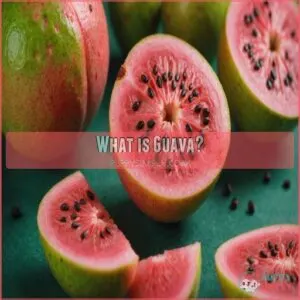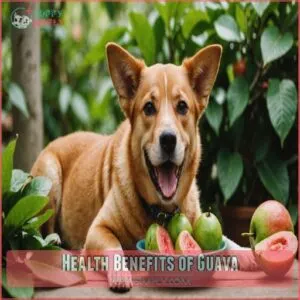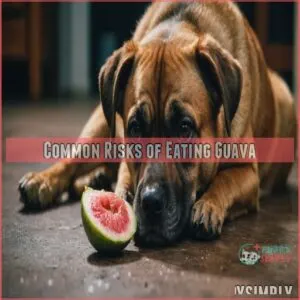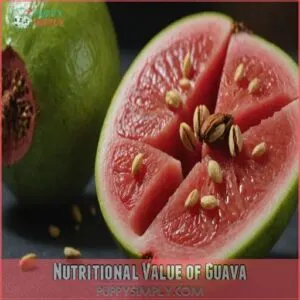This site is supported by our readers. We may earn a commission, at no cost to you, if you purchase through links.
 Yes, your dog can eat guava – but there’s a right way to serve this tropical treat!
Yes, your dog can eat guava – but there’s a right way to serve this tropical treat!
The fruit’s flesh is packed with immune-boosting vitamin C and fiber that can support your pup’s digestive health.
Just remember to remove the seeds and skin first, as these parts aren’t safe for your furry friend.
You’ll want to start with small pieces of fresh guava (about 10% of daily calories) to see how your dog responds.
While most pups handle guava well, it’s smart to watch for any signs of tummy trouble.
There’s actually a fascinating connection between guava and canine gut health that might surprise you.
Table Of Contents
- Key Takeaways
- What is Guava?
- Guava Safety and Consumption
- Health Benefits of Guava
- How to Give Guava to Your Dog
- Guava Allergies in Dogs
- Dog-Friendly and Toxic Fruits
- Common Risks of Eating Guava
- Nutritional Value of Guava
- Guava in Your Dog’s Diet
- Frequently Asked Questions (FAQs)
- Is guava good for dogs?
- Can dogs eat guava rinds?
- Can dogs eat Thai guava?
- Can dogs eat apple guava?
- Can puppies eat guava safely?
- What happens if my dog eats guava seeds?
- Do different dog breeds react differently to guava?
- Can guava help with my dogs digestive problems?
- Is frozen or cooked guava better for dogs?
- Conclusion
Key Takeaways
- You can feed your dog guava in moderation, but remove the seeds and skin first to prevent choking or digestive issues.
- Guava offers health benefits for dogs, including vitamin C for immune support and fiber for digestive health, but it shouldn’t exceed 10% of their daily calorie intake.
- Introduce guava slowly and watch for signs of allergies or digestive upset, as individual dogs may react differently to this fruit.
- While guava can be a healthy treat, it shouldn’t replace your dog’s regular meals, and you should always consult your vet before making significant changes to their diet.
What is Guava?
Ever wondered what’s behind the guava’s smooth skin and tempting aroma?
This tropical gem, with its roots planted in Central America’s rich history, has tickled taste buds across the globe.
Known for its sweet flavor with a hint of floral charm, guava is a fruit that takes many forms—like apple guava or the quirky pineapple guava.
Guava is a delight on the taste buds, but it’s also a powerhouse of vitamin C, helping keep your immune system in check.
While preparing homemade meals for your pet, it’s essential to consider their breed-specific needs, such as understanding the benefits of schnauzer homemade dog food.
Its uses range from tasty snacks to zesty jams, packing health benefits that support digestion without upsetting your stomach.
While your dog might eye it in curiosity, guava’s vibrant history and variety make it a fascinating backyard discovery!
Guava Safety and Consumption
Regarding feeding your dog guava, knowing which parts and types are safe is key.
You’ll want to stick to small amounts of flesh only, avoiding seeds and skin.
And choose varieties like apple and pineapple guava for a nutritious treat.
Parts of Guava Safe for Dogs
Before you offer your dog a taste of guava, keep these parts in mind: stick with guava flesh, avoid the seeds, and note some skins might pose issues.
Leaves aren’t good, so steer clear.
Here’s a quick list:
- Flesh: Safe to eat.
- Seeds: Remove them.
- Skin: Use caution.
- Leaves: Best avoided.
Types of Guava Safe for Dogs
Looking at the safe parts of guava, you’ll find that most guava varieties, like apple and pineapple guava, are okay for your furry friend, as long as you’re prepared to deal with potential messes similar to those caused by a playful brindle dog breeds companion.
Just skip guava seeds and skin due to risks.
Consider Red vs. White guava for their different flavors and nutrients, like vitamin K and B vitamins.
| Guava Type | Why It’s Safe |
|---|---|
| Apple Guava | Moderate benefits |
| Pineapple | Low risk, nutritious |
| White Guava | Tasty, nutrient-rich |
| Red Guava | Rich in vitamins |
Feeding Guidelines
Choosing the right guava can delight your pup, but there are some guidelines.
Feed small guava pieces a few times weekly to avoid fiber concerns and gastrointestinal issues.
Remember, moderation is key.
- Max 10% of daily calories
- Monitor for allergies
- Avoid guava seeds and skin
- Alternate with cooked sweet potatoes
- Mix with brussels sprouts or garden peas
Health Benefits of Guava
Guava offers your dog several nutritional perks, packing vitamins like A and C to boost their immune system and overall health.
It’s also a good source of fiber, which can help keep their digestion running smoothly.
Vitamins and Minerals in Guava
Guava isn’t just tasty; it’s jam-packed with vitamins and minerals like vitamin A, C, B, and K, plus calcium, iron, and magnesium.
While strengthening your dog’s immune system, it also supports bone health and skin health.
It’s like a mini powerhouse of nutrients that offer advantages over other fruits, making guava a delightful addition to your puppy’s diet in moderation.
Digestive Health
If you’re wondering about your dog’s gut health, guava could be a great addition.
Packed with fiber, it helps promote regularity and even curbs bloating.
While not a probiotic, guava’s fiber benefits are substantial, gently aiding digestion.
Like other fiber-rich foods, guava helps regulate bowel movements, a key aspect of digestive health.
For pups with diarrhea, a touch of guava might help things move along smoothly, making it a handy treat for digestive woes.
Immune System Support
Beyond keeping things moving smoothly in the digestive department, guava shines as an immune booster.
Packed with Vitamin C, guava benefits include fortifying your pup’s defenses like a natural shield.
Think of it as a tasty natural remedy that keeps the sniffles at bay.
Remember, though, moderation is key to avoid any unwanted dog allergies or tummy troubles.
How to Give Guava to Your Dog
When you’re ready to share a guava treat with your furry friend, remember to skip the seeds and skin for a hassle-free snack.
Fresh or dried guava are great options, but steer clear of guava paste and yogurt to avoid unnecessary sugar and dairy woes.
Fresh or Dried Guava
After considering guava’s benefits, let’s tackle how to serve it: fresh or dried? Both have perks, but it’s all about balance.
- Fresh Guava: Juicy and nutrient-rich, but serve it without seeds.
- Dried Guava: Great for storage, though watch for added sugar.
- Guava Drying Methods: Sun-drying keeps nutrients intact.
- Best Guava for Dogs: Go for ripe and organic.
Guava Paste and Yogurt
Switching from fresh guava, consider guava paste and unsweetened yogurt.
Guava paste, though tempting, packs a sugar punch. You won’t want to overload your pup’s system.
Opt for safer choices like homemade guava treats.
Think about yogurt’s sugar content, too. Dog-safe yogurt options can offer a creamy twist.
Keep your pup happy with tasty, mindful alternatives!
Precautions and Warnings
So, you’ve decided to give your pup a guava treat? Great!
But remember, moderation is key.
Avoid giving them guava seeds, skin, leaves, or buds.
These parts can cause tummy trouble.
Start with a tiny piece to see how they react.
If you notice any issues, like upset stomach or rash, stop immediately and consult your vet.
A little guava goes a long way!
Guava Allergies in Dogs
When you introduce guava to your dog, start with a tiny piece to see if there’s an allergic reaction.
Keep an eye out for signs like itching or swelling, and remember that while rare, allergies can happen, turning snack time into an unexpected adventure.
Signs of Guava Allergy
Guava allergies in dogs might sneak up, leaving you puzzled.
Watch out for common guava allergy symptoms such as itchy skin, paw licking, or unexpected ear infections.
Here’s a quick rundown to keep your furry friend safe:
- Hives or redness: Check for skin irritation.
- Swelling: Especially around the face.
- Digestive upset: Look for vomiting or diarrhea.
Introducing Guava to Your Dog
Spotting allergy signs? Then it’s time to introduce guava carefully.
Start with a small piece and watch for any dog reactions.
Consider consulting with a vet or looking into dog safe guava products online like this one for guava dog treats.
Keep an eye out for itching or any other adverse reactions.
If your pup seems fine, gradually add guava treats to the menu.
Remember, a safe amount guarantees happy, wagging tails.
Sprinkle guava into their diet, but don’t overdo it—less is more!
Dog-Friendly and Toxic Fruits
Exploring which fruits are dog-friendly and which are toxic is important to keeping your furry friend healthy.
While apples and strawberries make safe treats, steer clear of grapes and raisins for your dog’s safety.
Safe Fruits for Dogs
After considering guava allergies, remember that some fruits like fresh figs are safe for dogs as an occasional treat, as long as you remove the toxic fig plant. Let’s explore safe fruits for dogs.
Apples and bananas are tasty fruit snacks, just remember to remove any seeds or pits.
Blueberries and strawberries make great homemade treats, packed with vitamins.
Even mangoes can be part of dog-friendly recipes, provided you ditch the pit.
Enjoy these seasonal fruits, ensuring your pup’s snack time is safe and fun!
Fruits Toxic to Dogs
You’ve got a good list of safe fruits for your furry friend, but be cautious with those sneaky grapes and raisins.
While a single raisin might seem harmless, they pose severe risks.
Wild berries and tamarind can sneak under your radar too.
Always keep fruit safety tips handy, ensuring your dog’s snack-time remains joyful and worry-free.
Better safe than sorry!
Fruits to Be Wary Of
While many fruits are safe for dogs, some require caution.
Be careful with citrus fruits like lemons and limes, as their high acidity can upset your pup’s stomach.
Avocados contain persin, which might cause vomiting and diarrhea.
Cherries have pits that can be choking hazards.
Always remove seeds and pits from fruits like apples and peaches.
When in doubt, stick to dog-friendly options like blueberries or bananas.
Common Risks of Eating Guava
While guava can be a tasty treat for your pup, it’s not without risks.
You’ll want to watch out for digestive issues from overfeeding.
And, potential lactose intolerance if you’re mixing guava with dairy products.
Overfeeding and Digestive Issues
Too much of a good thing can quickly turn sour. Overfeeding your dog guava might lead to digestive issues, similar to those experienced by dogs with sensitive stomachs and allergies. It’s important to stick to the recommended portions to keep your furry friend healthy. Here’s why moderation matters:
- Diarrhea: Excess fiber can upset your pup’s tummy
- Bloating: Too much guava may cause uncomfortable gas
- Cramps: Overindulgence can lead to painful stomach aches
- Nutritional imbalance: Guava shouldn’t replace balanced meals
Remember, treats should make up no more than 10% of your dog’s daily calories.
Lactose Intolerance
Lactose intolerance can be a real pain for our furry friends.
Many dogs can’t digest dairy well, so yogurt-based guava treats might upset their tummies.
You can opt for lactose-free guava dog food alternatives online, such as Guava Dog Food.
Stick to dairy-free alternatives like plain guava or lactose-free treats.
If your pup’s a milk lover, try dog milk alternatives to keep their tail wagging.
Watch for signs of digestive issues like gas or diarrhea.
Remember, every dog’s different, so introduce new foods slowly and carefully.
Nutritional Value of Guava
You’ll be surprised by how much nutrition is packed into a tiny guava.
It’s loaded with protein, fiber, vitamins, and essential minerals that can benefit your furry friend when fed in moderation.
Protein, Fiber, and Vitamins
Guava packs a nutritional punch for your furry friend.
It’s a nutrient-rich treat that offers protein for muscle growth and repair.
The fiber benefits include improved digestion and regularity.
You’ll give your pup’s immune system a vitamin C boost, as guava contains more than oranges!
This fruit also provides vitamins A, E, and K.
Consider guava as a natural supplement to support your dog’s overall health.
Essential Minerals in Guava
Minerals pack a punch in guava, boosting your dog’s health.
These tiny powerhouses support various bodily functions.
Here’s what guava brings to the table:
- Calcium and phosphorus for strong bones and teeth
- Iron to keep the blood rich and energized
- Magnesium for muscle and nerve function
- Potassium to regulate heart rhythm and fluid balance
Remember, while guava’s mineral content is beneficial, moderation is key.
Too much of a good thing can upset your pup’s tummy.
Guava in Your Dog’s Diet
You can safely include guava in your dog’s diet, but it’s essential to remember that other fruits, like honeydew and cantaloupe, are also safe for dogs in moderation, but moderation is key.
While guava offers nutritional benefits, incorporating it into your dog’s diet can be done by balancing it with other healthy treats like apples safe dog fruits, it’s essential to balance it with other healthy treats and your dog’s regular meals.
Moderation and Balance
While guava’s nutritional benefits are impressive, remember: too much of a good thing can be bad.
Stick to the 10% rule for treats in your dog’s diet.
Offer small guava pieces a couple times a week max.
This way, you’re giving your pup healthy snacks without overdoing it.
Balance is key!
Keep an eye on portion control to make sure your furry friend enjoys guava safely as part of a well-rounded diet.
Alternative Treats and Snacks
You can whip up homemade dog treats using pet-safe fruits like apples or bananas instead of guava.
Commercially available snacks from trusted dog food brands offer convenient alternatives when you’re on the go.
For healthy options, try freeze-dried meat treats or dental chews that support your pup’s oral health.
Remember to check the nutritional content and ingredients list to make sure you’re choosing the best snacks for your furry friend.
Frequently Asked Questions (FAQs)
Is guava good for dogs?
Fresh guava can benefit your dog’s health similarly to how peaches provide antioxidants and other essential nutrients, when served in moderation.
Just remove seeds and skin first, and stick to small pieces a few times weekly to avoid digestive issues.
Can dogs eat guava rinds?
Don’t feed your dog guava rinds, as they’re difficult to digest and may cause intestinal blockages.
It’s best to remove the skin completely and only offer the flesh as an occasional treat.
Can dogs eat Thai guava?
Thai guava is perfectly safe for your furry friend to enjoy in moderation.
Remove the seeds and skin first, then offer small pieces as an occasional treat.
It’s packed with vitamins that’ll boost their health.
Can dogs eat apple guava?
Like a gentle treat from nature’s candy store, apple guava‘s safe for your furry friend.
You can feed your dog small, seedless pieces a few times weekly, but remember to remove the skin first.
Can puppies eat guava safely?
You can feed your puppy small pieces of guava as an occasional treat, but remove seeds and skin first.
Start with tiny amounts to check for allergies, and stick to 10% of their daily calories.
What happens if my dog eats guava seeds?
Imagine your dog as a curious explorer, stumbling upon a hidden treasure: guava seeds.
While not toxic, these seeds can be a choking hazard or cause intestinal blockage.
Monitor your pup closely and contact your vet if you notice any unusual symptoms.
Do different dog breeds react differently to guava?
While breed-specific reactions to guava aren’t common, individual dogs may respond differently.
Some might love it, others mightn’t.
It’s best to introduce guava slowly, watching for any digestive issues or allergic reactions, regardless of your dog’s breed.
Can guava help with my dogs digestive problems?
Guava’s fiber can indeed aid your dog’s digestion, promoting regularity and easing mild tummy troubles.
But don’t overdo it – too much might backfire.
Stick to small amounts as an occasional treat, not a cure-all for digestive issues.
Is frozen or cooked guava better for dogs?
Fresh guava is best for dogs.
Frozen or cooked guava can be safe, but they might lose some nutrients.
Stick to small, fresh pieces as an occasional treat.
Always remove seeds and skin before feeding your pup.
Conclusion
Like Sherlock Holmes unraveling a mystery, we’ve explored the question: can dogs eat guava?
The verdict’s in – yes, they can, but with care.
Remember, moderation is key.
Offer small amounts of fresh, seedless guava as an occasional treat.
Watch for any adverse reactions, especially when introducing it for the first time.
While guava can be a healthy addition to your pup’s diet, it shouldn’t replace their regular meals.
By following these guidelines, you’ll make sure your furry friend enjoys this tropical fruit safely and reaps its nutritional benefits.

















